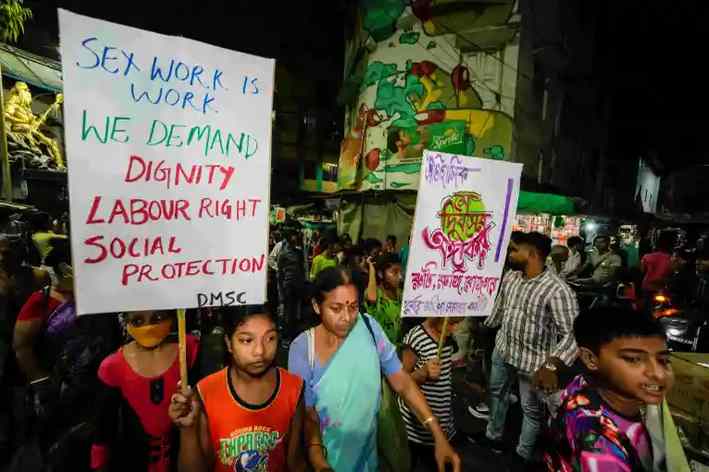Text of a petition initiated by SWASA, signed by 3640 sex workers and allies, sent to the UN Special Rapporteur on Violence Against Women, Reem Alsalem on January 31, 2024. This is in response to a call for inputs towards the Special Rapporteur’s report on violence against women to be presented to the UN Human Rights Council in June 2024.

Sex workers and allies at a rally demanding sex work be recognized as work under government labor rules, on the eve of International Labor Day, in Kolkata, April 30, 2022. AP Photo/Bikas Das. Image courtesy Human Rights Watch
We, the undersigned write to bring to your attention our concerns regarding the problematic terminology used in the call for inputs to the report of the Special Rapporteur (SR) on violence against women (VAW) and girls to the Human Rights Council. The thematic report of the SR on VAW that will be presented to the UN Human Rights Council at its 56th session in June 2024 proposes to examine the nexus between the global phenomenon of prostitution and violence against women and girls.
The call for inputs states that the Special Rapporteur would like to receive inputs to better understand the relationship between prostitution and violence against women, to clarify terms, approaches and actions States should take in order to maintain the spirit of international human rights law and to effectively protect women and girls from all forms of violence.
Unfortunately, the Special Rapporteur’s call for inputs exemplifies the rights-unfriendly terms and assumptions against which sex workers and their allies have struggled for decades. The Special Rapporteur seems to have rejected the term “sex worker” in favour of denigrating and archaic terms such as “women who have been prostituted”, which embody the idea of women not in control of their own destiny and livelihood. The call for inputs seems to equate sex work and human trafficking, a conflation that the agencies of the UN Joint Programme on HIV/AIDS have condemned.
We believe that a “call for inputs” that starts out espousing a framework that denies sex workers’ rights cannot lead to a process that will contribute to the respect, protection and fulfilment of those rights.
We take this opportunity to underscore the importance of avoiding any terminology that conflates human trafficking, sexual exploitation and sex work. Such a conflation is inaccurate: trafficking of persons into forced or coerced labour (including sexual exploitation) cannot be equated with consensual sex work. Such a conflation also contributes to human rights violations against sex workers, who end up further policed and abused despite being characterized as “victims” of trafficking. By way of example, we recall the report of the UN Special Rapporteur on violence against women regarding her 2013 mission to India, in which she “noted a tendency to conflate sex work with trafficking in persons, and when sex workers are identified as victims of trafficking, the assistance that is provided to them is not targeted to their specific needs.” The Special Rapporteur included specific recommendations to review the country’s statute on “immoral traffic” that de facto criminalizes sex work and to “ensure that measures to address trafficking in persons do not overshadow the need for effective measures to protect the human rights of sex workers.”
UNAIDS produced a Guidance Note on HIV and sex work (updated in April 2012). This document was the result of extensive consultation and input from our group as well as the Global Working Group on HIV and Sex Work Policy and was informed by a series of regional consultations in Latin America, the Caribbean and southern Africa, as well as national consultations in China, Malawi, Peru, Thailand and Zimbabwe. Further consultations were held in Kenya, Nepal, Pacific Island Countries and southern Eastern Europe. The document was developed to provide the UNAIDS Cosponsors and Secretariat with a coordinated human-rights-based approach to ensuring universal access to HIV prevention, treatment, care and support in the context of sex work.
A key conclusion of the report was that:
In addition to the UNAIDS guidance cited above, the earlier International Guidelines on HIV/AIDS and Human Rights, issued by UNAIDS and the Office of the UN High Commissioner for Human Rights, call on States to review criminal laws regarding sex work “with the aim of decriminalizing,” and to ensure that criminal law does not impede provision of HIV prevention and care services to sex workers and their clients. Recommendations for decriminalization have also come from, among others, the Global Commission on HIV and the Law, the Global Alliance Against the Traffic in Women (GAATW), the UN Special Rapporteur on the right to health, WHO and UNFPA (other cosponsors of UNAIDS alongside UN Women), and major international human rights NGOs such as Human Rights Watch and Amnesty International.
A comprehensive approach that includes harm reduction acknowledges the reality of sex work and seeks to protect the well-being of sex workers, reducing the potential for violence and discrimination.
Towards this end, we sex workers and allies demand:
1) That the Special Rapporteur’s call for inputs exemplifies rights friendly terms and assumptions endorsed by all cosponsors of UNAIDS alongside UN Women.
2) The call for input to the report of the Special Rapporteur on violence against women and girls to the Human Rights Council on prostitution and violence against women and girls should explore harm reduction strategies rather than concentrating on punitive measures.
3) The call should emphasize an empowerment-centric approach that acknowledges the human rights of sex workers.
4) The UN must continue to address the human rights of sex workers, particularly in the context of global migration, by promoting policies that protect their rights, safety, and well-being.
We believe that promoting respectful and inclusive language is a crucial step towards ensuring the human rights and dignity of all individuals, including those engaged in sex work. Thank you for your attention to this matter.